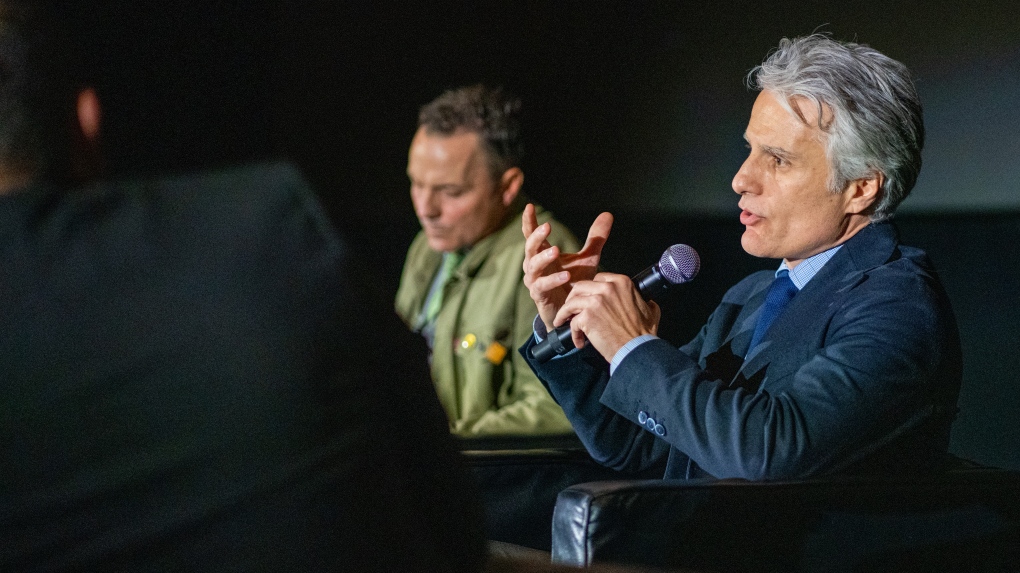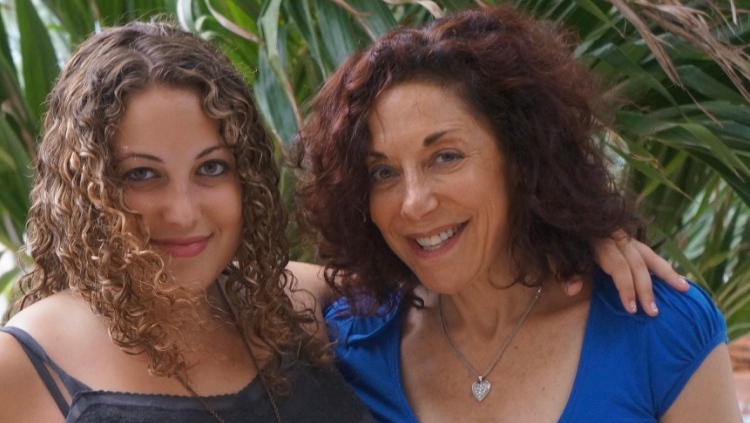Surgery extends life of woman with same brain cancer as Gord Downie
"My mother was my best friend," recollects Leslie Hacker. "I just look for her somewhere inside my heart every day."
It has been three years since Susan Kendall passed away from glioblastoma, a fast-growing and aggressive brain tumour that forcefully invades brain tissue.
The days since then have been difficult for her daughter, Hacker, but she says she's grateful for every second the two had together.
"We were living in Toronto at the time, and all the doctors there were telling us that she had a year to live," she recalls, adding numerous doctors in the US told her similarly. "But then we heard about Dr. Petrecca at the [Montreal] Neuro, and he actually said, 'No, she has several years and could live with this for many years.' He really gave her the hope that no other doctor could."
IN PHOTOS: A Brilliant Night raises almost $1M for brain cancer research
Dr. Kevin Petrecca, chief of neurosurgery at the Montreal Neurological Institute-Hospital, operated on her mother four times.
"Every surgery is a big risk to her life, and we never knew if she was going to come out of it alive or OK," said Hacker. "Especially because he was the only doctor in Canada that would operate on her that many times."
Kendall ended up living another five years.
'A DEATH SENTENCE'
"We had an experimental protocol here at the time, which we still have, which we've had tremendously successful results with," Petrecca tells CTV News, noting he usually doesn't like to speak about specific patients as each case is unique. "We start the chemotherapy a little bit earlier than usual, and we give a dose-intensifying radiotherapy treatment along the edge of the resection cavity or the surgical margin where we would expect the cancer to recur."
According to the medical community, once a diagnosis of glioblastoma has been given, there is only a five per cent survival rate.
It's what many doctors consider "a death sentence."
"Surgery is indiscriminate; we remove all of the abnormality," Petrecca explains, though he notes that 95 per cent of the time, cancer will recur at the edge of where surgery stopped. "But it's important to understand that this is a very invasive cancer and that it's a cancer of the brain, meaning it arises from the substance of the brain and looks very much like normal brain at the margins."
He says this combination of surgery plus intensive treatment is what gave Kendall her five extra years.
"That's an exceptional result, there's no doubt," Petrecca said. "Our team at the McGill University Health Centre, I think we published at least four papers documenting significantly elevated progression and overall survival with that approach compared to the standard of care."
 A Brilliant Night 2023. (Credit: Geneviève Goyette/A Brilliant Night)
A Brilliant Night 2023. (Credit: Geneviève Goyette/A Brilliant Night)
Dr. Kevin Petrecca speaks alongside Gord Downie's brother, Patrick Downie, at the 2023 A Brilliant Night fundraiser. (Credit: Geneviève Goyette/A Brilliant Night)
Petrecca has long been credited with incredible advances in brain cancer research.
Most recently, he discovered that brain cancer cells are not formed where the tumour is, but in another area of the brain where stem cells grow.
"Unfortunately, those cancer cells that are infiltrating into the brain are stem-like cells," said Petrecca. "They're very resistant to radiation chemotherapy... These cells resist those treatments, and that's why we have recurrences."
IN PHOTOS: A Brilliant Night raises almost $1M for brain cancer research
It's a huge discovery for the medical field.
"It's not a uniform cancer cell type. There are multiple types of cancer cells within each patient's tumour," adds Petrecca. "Developing therapies against a moving target that is not uniform, even within a particular patient, is extremely challenging."
He says when it comes to this disease, which affects between four to eight people per 100,000, the tumour must be deconstructed on a cell-by-cell basis to identify the subpopulations that need to be targeted.
"That's a newer approach to treatment of glioblastoma that I hope will be beneficial, hopefully, within the next three, five years," he said.
TRAGICALLY HIP
Kendall died from the same form of brain cancer that took the life of Canadian singer-songwriter Gord Downie in 2017.
Hacker says she and her mother actually attended one of The Tragically Hip's concerts as the band embarked on their last-ever cross-Canada tour with Downie.
"I'm just grateful I had that extra time with her because I can't imagine all the things we would have missed," she told CTV News. "We ended up travelling together and making so many extra memories."
A BRILLIANT NIGHT
A few years ago, Hacker says she discovered the A Brilliant Night fundraiser, which raises money for The Brain Tumour Programme at the Montreal Neuro, led by Petrecca.
She says she knew immediately that she wanted to get involved.
"I actually didn't know about it when my mom was sick. I only found out about it after she passed away," she said.
A Brilliant Night was co-founded in 2015 by a group of volunteers who lost loved ones to brain cancer.
Since then, the fundraiser has raised $7.3 million for the program, which focuses on studying the origins, development and properties of brain cancer stem cells, while working to develop new tools for brain cancer surgery.
IN PHOTOS: A Brilliant Night raises almost $1M for brain cancer research
The Brain Tumour Programme is considered one of the largest and most comprehensive brain tumour research and treatment programs in Canada.
The 2023 edition of A Brilliant Night, which took place on Oct. 11, raised $869,770 for the cause.
 Leslie Hacker and her mother, Susan Kendall. (Courtesy: Leslie Hacker)
Leslie Hacker and her mother, Susan Kendall. (Courtesy: Leslie Hacker)
Hacker says one of the last great memories she has of her mother was her 60th birthday party, which took place a few months before she passed away.
"She had all of her closest friends and family there with her. It was so special," she said. "I think for her, it was just to be around her kids, my brother and I, and surrounded by love and people closest to her."
Hacker says the last five years with her mother were difficult -- travelling back and forth from Toronto to Montreal, never knowing if she would make it through surgery -- but they were also a gift from Petrecca himself.
"He was my mom's hero," said Hacker. "My mom is with me every day. I moved to Vancouver, and she was supposed to be here with me. I miss her incredibly."
Brain cancer research at the Montreal Neuro happens year-round, and A Brilliant Night continues to look for volunteers and donations.
CTVNews.ca Top Stories

PMO staffers to meet Monday as Trudeau's announcement looms
As an announcement from Prime Minister Justin Trudeau about his political future looms, CTV News has confirmed that staffers in the Prime Minister's Office will meet Monday.
W5 INVESTIGATES One Canadian couple's fight against a contractor who defrauded them
Pull into the driveway at John and Julie Ridley's house and you'll notice large patches of red siding are missing from their house and garage. What was supposed to be a dream retirement home for the couple is now a daily reminder of what went wrong.
Canada closes 'flagpoling' loophole for temporary visa holders
Temporary residents of Canada will no longer be able to utilize the flagpoling process to initiate work or study permits, following a ban from the Canada Border Services Agency.
opinion What you need to know about filing your taxes in 2025
This year, there are several changes to be aware of when filing your 2024 taxes. Personal finance contributor Christopher Liew outlines the key changes to keep in mind as the tax deadline approaches.
'The Brutalist,' 'Emilia Perez' triumph at Golden Globes
Brady Corbet's 215-minute postwar epic 'The Brutalist' and Jacques Audiard's Spanish language, genre-shifting trans musical 'Emilia Perez' won top honours at the 82nd Golden Globes on Sunday.
The Vivienne, star of 'RuPaul's Drag Race UK', dies at 32
British reality show 'RuPaul's Drag Race UK' winner James Lee Williams, aged 32, popularly known as The Vivienne, has died.
Driver who entered Canada 'without stopping' at B.C. border crossing arrested: police
A man who illegally blew through the Canada-U.S. border crossing in Surrey, B.C., Sunday morning has been arrested, according to authorities.
'Absolutely devastating': Southern Manitoba golf course clubhouse burns for second time in 4 years
A golf course clubhouse in Morden, Man. went up in flames Sunday for the second time in less than four years, and mere days after its reopening from the previous fire was celebrated.
Three missing children in New Brunswick Amber Alert found safe: police
Police in New Brunswick have cancelled an Amber Alert in connection to three children who were reported missing and possibly abducted on Sunday.































